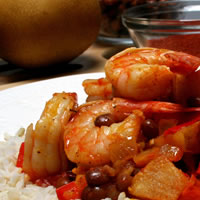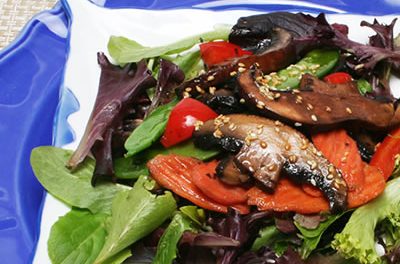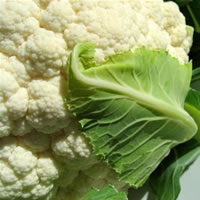As Mexican cooking has become increasingly popular, chefs have taken to exploring its regional aspects. A refreshing example of this, both for its flavor and unexpected use of common Mexican ingredients, is a soup created by restauranteur Bob Kinkead, featured in his recent Kinkead's Cookbook. The easy-to-make version below, adapted from his recipe, shows influences from the Yucatan peninsula jutting out from Mexico's southern Gulf Coast.
Food in the Yucatan reflects influences of the ancient Mayan culture. The Mayans, as well as Aztecs, the ancient native culture most associated with Mexico, were fond of tomatillos, also called tomate verde. They are a cousin of the tomato, which Mexicans call jitomate or tomate, depending on the region of the country. This dish also calls for fresh tuna, typical of use of the excellent seafood from local waters in Yucatan cooking.
Tomatillos are most commonly used in salsa verde cruda, the green table sauce, and salsa verde, the lightly cooked sauce used for enchiladas and chilaquiles. Both these loose, green sauces often call for lightly-boiled tomatillos, because cooking eliminates their raw taste and rounds out the lemony, clean flavor we enjoy in most dishes featuring this Mexican native.
The most flavorful tomatillos are small. and soft green to yellow or purple outside. All are vivid green inside. They should feel firm, and the papery husk covering them should fit tightly, feel dry and show no mold spots.
One reason truly authentic Mexican cooking is rare in the U.S. is that many of its techniques take time. Here, both the tomatillos and onions are dry roasted briefly in a cast iron or other heavy skillet. Different from conventional grilling, this sears them for outstanding flavor with less charring. Tangy and hot, the pureed soup retains a texture that contrasts deliciously with the seared tuna and diced avocado. Crushed corn chips add crouton-like crunch.
Tomatillo Soup with Fresh Tuna
Makes 4 servings.
Adapted from a recipe in Kinkead's Cookbook.
- 1 poblano chili pepper
- 3 garlic cloves, chopped
- 1 can (4 oz.) green chiles, drained
- 1 large onion, preferably white, cut crosswise into 1/2-inch slices
- 3/4 lb. tomatillos, husked and halved crosswise
- 1-1/2 packed cups cilantro leaves
- 2 cups fat-free, reduced sodium chicken broth, divided
- Salt, according to taste
- 1 Tbsp. extra virgin olive oil
- 3/4 lb. yellowfin or albacore tuna, cut in 3/4-inch cubes
- 1/2 peeled avocado, diced, for garnish
- 1/4 cup chopped scallion, for garnish
- 16 tortilla chips, crumbled, for garnish
- Roast the poblano pepper over an open flame until its skin blisters. Seal it in a paper bag to steam for 10 minutes. Using your fingers, slip off the skin. Seed and chop the pepper. Place it in a blender. Add the garlic, canned chiles and cilantro. Set aside.
- Heat a heavy skillet over medium-high heat. When hot, add the onion slices in one layer. Cook until grilled in places, 1 minute. Turn and grill on the other side, 1 minute. Transfer to a plate. Pan-grill the tomatillos, cut side down, until dark brown in places, about 2 minutes. Turn and cook until they brown in spots on the rounded side, 2 minutes. Transfer them to the plate.
- Coarsely chop the tomatillos and onions. Add them to the blender along with 1 cup of the broth. Process into a pulpy puree. Transfer to a deep saucepan. Stir in remaining broth. Season to taste with salt. Over medium heat, bring to a boil. Transfer to 4 shallow soup bowls.
- Rinse and dry the skillet. Add the oil and heat over medium-high heat. Add the tuna chunks, searing and turning them until they are opaque all the way through, about 3 minutes. Divide the fish among the bowls. Garnish with avocado, scallions and tortilla chips. Serve.
Per Serving:
181 calories,
5 g. total fat (less than 1 g. saturated fat),
11 g. carbohydrate,
23 g. protein,
3 g. dietary fiber,
434 mg. sodium
Diabetic Exchanges: 1/2 Bread/Starch, 3 Low-Fat Meat
AICR









